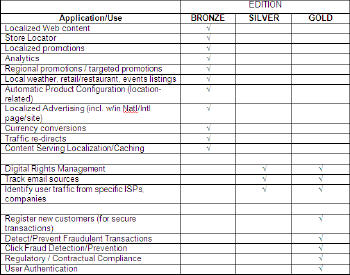Directions Magazine (DM): What is Quova On-Demand? As I understand it you took the existing Quova software solution for determining the location of an IP address and turned it into a Web Service.
Kerry Langstaff (KL): The Quova On-Demand is not so much a software solution, but rather a subscription to our database of IP address information. With Quova On-Demand, the company is offering an additional way to access the Quova data. Previously customers placed a server on their location and, through an API, queried the database. Now we are offering a hosted Web service where customers can use a simple script to access the data. This can usually be set up in under 15 minutes.
DM: How would a developer implement the Web service for, say, a vendor worried about fraudulent purchases?
KL: Access to the Quova IP data would be granted for an organization to create business rules to interpret the data for their specific application. For example, sophisticated e-retailers look for specific IP address fraud indicators, such as checking the distance between the actual and expected user location, and create rules in their Web applications to automatically decline, or flag for review, orders falling X miles or more away from the shipping or billing address. Many report that orders coming from 500 miles or more away from the expected location have a higher probability of being fraudulent. Checking for mismatches of credit card billing addresses compared to where the customer's IP address is located can be a great indicator of fraud. Research shows that when a customer provides a registration address in one U.S. state but actually places the order from another, this is a likely indicator of fraud. Transactions across national borders raise the red flag higher yet. International transactions represent nearly half of all credit card charge backs, and a short list of nations (Ghana, Vietnam and Lebanon among them) produces the most fraudulent transactions. E-retailers can use IP geolocation to automatically decline or flag suspect transactions. Where the risk from a particular location is extreme, that location can be blocked.
DM: Was this move to the cloud something customers or potential customers requested?
KL: Yes and no. Some customers with minimal IT resources prefer a hosted service. We also want to make it easier for online businesses of all sizes to get started quickly and easily using IP geolocation.
DM: On-Demand pricing is on a "per query" basis. Is the intent to be able to serve both small and high volume users?
KL: Yes.
DM: My sense is the current Quova user base tends toward high volume. Is that correct?
KL: No, Quova customers use IP geolocation data for a variety of applications - from fraud detection in online transactions, to re-directing home Web pages based on the user's country, to managing digital content downloads. We have customers who receive just thousands of queries per month and customers who have billions of queries per month. The new pricing model is intended to make it easier for those just starting out to buy what they need now, and then they can scale as their businesses grow. We expect most of our customers will use the new Web service.
DM: Please explain the different levels of data (Bronze, Silver, Gold) and what type of applications might require each one. Do users of the On-Demand service select which level of data is used?
KL: Quova offers three standard Data Editions: Bronze, Silver and Gold and we help customers choose the edition that's right for them, based on their intended uses. Sample applications, and the appropriate editions for each, include:
 |
This gives you the ability to gauge not only where the IP address is located, but where your user is located. For the most localized targeting of content, you can use the IPRT as an additional way to filter traffic that may be coming from locations outside your target area.
The Silver Edition includes everything from the Bronze Edition, plus information about the visitor's ISP (carrier) and domain (top- and second-level domains). Whether for targeting content or for helping identify acceptable eCommerce transactions, this additional information can help round out the online profile of your visitor. For repeat visitors, this information can be used to help confirm a user's identity and usage patterns.
The Gold Edition includes everything from the Silver Edition, plus Quova's GeoAnonymizer data - which track the use of individual anonymizing proxies around the world. Identifying users who are connecting via these proxies can help your business block or challenge potentially fraudulent transactions, as well as click fraud. Identifying anonymizer use is crucial in both regulatory and contractual compliance applications.